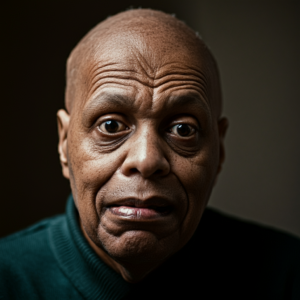Dementia is often misunderstood as a natural part of aging. In reality, it’s a group of symptoms that can affect memory, thinking, and social skills. One of the earliest signs of dementia in men is forgetting familiar faces or losing track of conversations.
As men age, declining testosterone levels increase the risk of cognitive decline. This makes it crucial to spot the early signs of Dementia in men.
If you’re noticing these changes, don’t ignore them. Taking action early and consulting a professional can help you manage your mental health.
In this article, we will explore the early signs of Dementia in men, its causes, and treatment options. Let’s dive in.
What are the early signs of Dementia in men?
The early signs of Dementia often start subtly but can significantly affect daily life. Recognizing them is essential for timely support and care. Here are some key symptoms to watch for:
-
Memory loss particularly remembering recent events
You may struggle to recall things that happened recently, like forgetting appointments or misplacing everyday items like your glasses.
For example, you may forget where you left your car keys right after using them. It’s not about forgetting distant memories but struggling with new information.

-
Difficulty with language or communication
Finding the right words can become challenging. A common sign is finding it hard to express yourself.
You may find yourself pausing in the middle of conversations, struggling to find the right words, or misusing common phrases like “that thing you use to open a door” instead of saying “key,” making interactions confusing which can be frustrating in social situations.
-
Challenges in daily decision-making
One of the other signs of dementia is difficulty in making simple decisions, like what to wear, what to cook for dinner or which route to take to work, may become more difficult and confusing.
For instance, a man who once handled family finances might suddenly struggle to pay bills or balance a check book.
-
Reduced Concentration
Concentration will decrease making it hard to focus on tasks or conversations. You might notice that you can’t stay focused during meetings or even while watching a TV show, leading to frequent distractions.
You might notice that it’s harder for them to focus on tasks or conversations. For example, a man who used to enjoy reading may now lose interest, unable to follow the storyline.
-
Apathy and Confusion
A lack of interest in hobbies, work, or social activities is another red flag. You may find yourself feeling indifferent, avoiding friends or family, or becoming confused about where you are or how you got there. You may also become easily irritated and anxious more often.

Symptoms of Dementia and when you should see a Doctor
It’s easy to brush off forgetfulness or confusion as part of getting older, but some signs shouldn’t be ignored.
Dementia doesn’t just happen overnight, it starts with small changes that will become more noticeable over time.
By paying attention to these signs of dementia, you can take action sooner rather than later.
-
Decline in cognitive function
This is a key sign. it’s one of the most common signs of dementia in men, particularly when it affects everyday activities. It’s not just about forgetting names or dates, it is when you forget what you were doing or constantly lose track of things like your phone or wallet.
Example:
- Repeatedly asking the same questions
- Misplacing items in strange places (like your phone in the fridge)
-
Withdrawal and isolation
You might also find yourself struggling with words or getting confused in familiar places. When simple decisions start feeling overwhelming, or you find yourself withdrawing from social activities, it’s time to pay attention.
Other signs include:
- Struggling to find words during conversations
- Confusion about time or place (getting lost in familiar areas like your street)
- Difficulty making decisions, even for simple things like choosing meals
If these signs become a regular part of your life, it’s important to see a doctor. Catching Dementia early can lead to better management and treatment options, giving you more control over your health.
What causes Dementia in men?
Dementia is a complex condition influenced by various factors, including lifestyle habits, genetics, and underlying health conditions. Understanding these causes can help shed light on prevention strategies and potential risk factors.
Key Causes of Dementia in Men:
-
Alzheimer’s Disease:
This is the most common cause of dementia, characterized by the buildup of abnormal protein deposits in the brain.
-
Vascular Dementia:
Caused by damage to blood vessels in the brain, often due to stroke or other circulatory problems.
-
Lewy Body Dementia:
A type of dementia associated with the buildup of abnormal protein deposits called Lewy bodies in the brain.
-
Frontotemporal Dementia:
Affects the frontal and temporal lobes of the brain, leading to changes in personality, behavior, and language.
-
Mixed Dementia:
A combination of different types of dementia, such as Alzheimer’s and vascular dementia.
Other common causes of dementia in men

-
Lifestyle factors like diet, exercise, and mental stimulation
The way men live can significantly impact their brain health. A lack of physical activity, unhealthy diet, and poor mental stimulation can increase the likelihood of developing Dementia.
Men who don’t engage their minds or maintain a healthy lifestyle may notice cognitive decline earlier. Simple actions like staying active, eating balanced meals, and challenging the brain through puzzles or reading can make a big difference.
-
Genetic predisposition and family history
If Dementia runs in your family, you may be more susceptible. Men with a family history of Alzheimer’s disease or other forms of Dementia are at greater risk.
According to the CDC, approximately 5 million U.S. adults aged 65 or older have Alzheimer’s and related Dementia, and this number is expected to rise to 14 million by 2060. As men age, especially beyond 60, the likelihood of developing this disease doubles.
-
Cardiovascular health in brain function
Heart health directly impacts brain function. Men with high blood pressure, heart disease, or other cardiovascular issues are at higher risk of developing Dementia.
When the heart isn’t functioning properly, it reduces blood flow to the brain, impairing cognitive function. Prioritizing cardiovascular health through exercise and a healthy diet may reduce the risk of Dementia later in life.

How does Dementia affect men differently than women?
Researchers have long recognized that dementia in men and women differs significantly, according to the Alzheimer’s Association.
Even though it is the fifth leading cause of death for women and the eighth leading cause of death for men, dementia impacts men differently than women, primarily due to differences in brain function and what society expects of them.
Recognizing these differences can encourage men to seek timely help and manage the condition effectively.
-
Gender-based differences
Men tend to experience Dementia in ways that affect their thinking and problem-solving skills earlier than women. This can impact their ability to make decisions or handle tasks like planning and organizing.
While women might face more severe memory loss, men often struggle with daily functioning. This means they may struggle with daily tasks that require logical thinking, which can affect their independence.
Effects of gender-based difference on men:
- Difficulty managing staffs at work, money or paying bills
- Trouble making decisions, even for simple tasks like going shopping
- Struggling with problem-solving in work or personal life
-
Societal pressures on men and seeking help
Men often face societal pressure to be independent and not show vulnerability, which can prevent them from seeking help for Dementia.
Many men avoid discussing the fact that they don’t remember things again or when they experience confusion out of fear of appearing weak or helpless. This reluctance can delay diagnosis and treatment, making symptoms worse over time.
Effects of societal pressure on men:
- Avoiding doctor visits, even when symptoms are noticeable
- Treating forgetfulness or confusion as a part of “just getting older”
- Refusing help with daily tasks despite growing challenges

Can Dementia be prevented or slowed down in men ?
While there’s no particular cure for Dementia, men can take proactive steps to reduce the risk or slow its progression. There’s good evidence that a healthy lifestyle can help reduce your risk of developing dementia when you’re older.
These simple steps can help you manage your brain health and potentially slow down the risk of Dementia.
Healthy living tips to reduce risk
Taking care of your physical health is essential in lowering the chances of developing Dementia. Here are some healthy living tips that can contribute to better brain health;
- Engage in regular physical activity like jogging, swimming, or even brisk walking
- Eat a diet rich in fruits, vegetables, and lean proteins to nourish the brain
- Avoid smoking and excessive alcohol consumption, both of which can harm brain function
Staying mentally active and engaged
Keeping your mind sharp is important in delaying the onset of Dementia. Engage in stimulating activities that’ll challenge your brain and help preserve cognitive abilities. Some of these activities include;
- Read regularly or learn new skills, like a language or musical instrument
- Solve puzzles, play chess, or engage in memory-based games
- Take on hobbies that require focus, such as woodworking or photography
Engaging in social connections to improve mental health
Strong social bonds play a vital role in maintaining brain health. Men who stay connected with family and friends tend to have better mental well-being and are less likely to experience a decline in their brain health. You can do this by;
- Maintain close relationships with family members and friends
- Join community groups or clubs to stay socially active
- Volunteer or mentor others to stay engaged with your community

What treatment options are available for men with Dementia?
Dealing with Dementia can be challenging, but there are ways to manage the symptoms and improve everyday life. They include;
-
Medication and therapy options
There are certain drug treatment can help slow down memory loss and keep the mind sharper for longer. Therapy can also help with managing emotions and staying mentally active.
- Therapy like counselling can help with mood swings or confusion
- Occupational therapy teaches ways to handle daily tasks more easily
-
Caregivers and support systems
Having a solid support system makes all the difference. Whether it’s family members or professionals, the right help can take off some pressure and make day-to-day life smoother. One way you can do this is by;
- Get your family members involved to provide both emotional and practical help
- Consider hiring professional caregivers for more hands-on support
- Join a Dementia support group to connect with and share experiences with others in the same situation

-
Lifestyle modifications for better brain health
Simple lifestyle changes can keep the brain healthier for longer. For instance:
- Regular exercise like walking or light jogging helps brain function
- Eat foods rich in fish and vegetables for better brain health
- Stay mentally engaged by reading, doing puzzles, or learning new skills
In summary…
Dementia is a serious condition that can significantly impact a person’s quality of life. Recognizing the early signs of dementia is crucial for seeking timely treatment and support.
So, whether it’s memory loss, confusion, or challenges in everyday tasks, paying attention to these changes can make all the difference. If anything feels off, don’t hesitate to reach out to a healthcare professional.
The sooner you take action, the better you can manage the symptoms and live a fuller, more confident life. Your health is worth the effort.
WHAT OTHER SIGNS OF DEMENTIA IN MEN do you know? Let us know in the comment section below. Cheers!
________________
At Enthusiast Express, we’re dedicated to supporting men in maintaining their mental sharpness and overall well-being as they age.
We know that recognizing and addressing the early signs of Dementia can be overwhelming, but you don’t have to face it alone. Our mission is to provide practical advice and guidance for managing brain health and living life to the fullest.
Join Our Community
Connect with others who share your concerns, exchange tips on keeping your mind active, and stay motivated to prioritize your mental health.
Let’s tackle the challenges of aging together, one proactive step at a time. Your journey to better brain health starts now!

